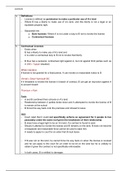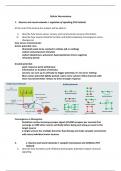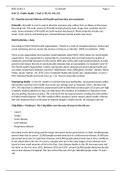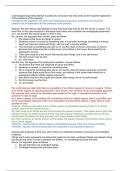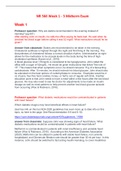FUNDAMENTAL RIGHTS
Jumping Joan, an Australian pop star, is on vacation in SA. Can she invoke the Bill of Rights to
protect her in the following circumstances?
a) She has been assaulted by a thug in the presence of members of the South African Police
b) She has been injured in a motor accident and needs medical treatment
c) She wishes to vote in the local government elections
d) She would like to enrol at Unisa for a one month certificate course in basic Afrikaans
e) She lost her passport and was arrested at a night club. The authorities refuse to give her a hearing
before they deport her
a) Yes. JJ can invoke the right to security of the person. S12 of the Constitution provides that all persons are
protected by this right and it also places a duty on the police to protect all persons from harm and danger.
b) Yes. In terms of section 27(3) of the Constitution, no one may be refused emergency medical treatment.
c) No. Section 19 of the Constitution provides that only citizens of the country may vote in governmental
elections and since she is not a citizen she is not entitled to this right.
d) Yes. In terms of section 29 of the Constitution everybody has the right to education.
e) Yes. In terms of section 33 of the Constitution everyone is entitled to just administrative action.
True or false? Give reasons.
a) The Constitutional Court has exclusive jurisdiction to declare an Act of Parliament
unconstitutional. (2)
b) The Constitutional Court has jurisdiction in constitutional matters and nonconstitutional
matters. (2)
c) The High Courts and the Supreme Court of Appeal have jurisdiction to declare a provincial Act
unconstitutional, but such an order will not have any force before it is confirmed by the
Constitutional Court. (2)
d) A magistrates’ court may declare a municipal bylaw unconstitutional. (2)
e) A magistrates’ court may interpret legislation in accordance with the Bill of Rights. (2)
a) False. A High Court or Supreme Court of Appeal may declare an Act of Parliament unconstitutional, but
subject to confirmation by the Constitutional Court.
b) False. In terms of section 167 (3) (b), it may decide only constitutional matters, and issues connected with
decisions on constitutional matter.
c) True. The position is the same as with Acts of Parliament.
d) False. A magistrates’ court may not pronounce on the constitutionality of any law.
e) True. A magistrates’ court may apply the Bill of Rights indirectly in terms of section 39(2).
Discuss whether, and to what extent, a juristic person can rely on the protection of the Bill of
Rights. For instance, can Noseweek, an independent newspaper, invoke the right to life and the
right to freedom of expression? (5)
In the first Certification judgment, the Court emphasized that many universally accepted fundamental
rights will be fully recognized only if afforded to juristic persons as well as to natural persons.
Section 8(4) provides for the protection of juristic persons. A juristic person is entitled to the rights of the
Bill of Rights to the extent required by the nature of the rights and the nature of that juristic person. In
order to determine whether a juristic person is protected by a particular right or not, two factors must be
taken into consideration: firstly, the nature of the right, and secondly the nature of the juristic person. The
nature of some fundamental rights is such that these rights cannot be applied to juristic persons.
Noseweek cannot be protected by the right to life, which is afforded to human beings only, although it may
have standing to approach a competent court if the requirements of section 38 have been complied with.
Other rights, such as the right to freedom of expression, have been specifically afforded to the media,
which are often controlled by juristic persons.
, Does the Bill of Rights apply to the following?
i) a decision by Parliament to adopt a new Immigration Act
ii) a decision by a private school to expel five learners
iii) an interim interdict issued by a magistrates’ court
iv) the requirement that only people between the ages of 20 and 40 may apply for membership to a
gym
v) a will in terms of which a female descendant is prevented from inheriting the deceased estate.
(10)
The question involved the application of the Bill of Rights to those who are bound by the Bill of Rights.
Relevant provisions in the Constitution are section 8(1) and (2).
8(1) provides that the Bill of Rights applies to all law, and binds the legislature, the executive, the
judiciary, and all organs of state.
8(2) makes provision for the application of certain rights to natural and juristic persons.
i) Yes, in terms of section 8(1), the legislature is bound by the Bill of Rights.
ii) Yes, it could be argued that a private school performs a public function in terms of legislation and that it is
therefore an organ of state. If this is the case, the private school will be bound in terms of section 8(1).
Alternatively, one can argue that the school, as a juristic person, will be bound in terms of section 8(2).
iii) Yes, the judiciary is bound in terms of section 8(1).
iv) A gymnasium is not an institution which performs a public function in terms of legislation. It is therefore
not an organ of state and is not bound in terms of section 8(1). However, it will be bound in terms of
section 9(4) read with section 8(2). Section 9(4) makes it clear that no person (including a juristic person)
may discriminate unfairly.
v) The testator is bound in terms of section 9(4) (read with section 8(2)) not to discriminate unfairly.
What was the approach of the Constitutional Court to the justiciability of socio-economic rights in
the Certification judgement?
In this judgment the court affirmed the justiciability of socio-economic rights.
The argument against the inclusion of socio-economic rights in the Constitution was that it amounts to a
breach of the doctrine of separation of powers and gives the judiciary the power to decide on a political
question of how to distribute public resources and thus make orders about how public resources should
be spent.
The court rejected this argument and its response was that the enforcement of civil and political rights had
monetary implications as well - for example legal aid, etc. Thus, the fact that socio-economic rights have
budgetary implications does not necessarily amount to a breach of separation of powers.
The court said that these rights are justiciable in that they can be negatively protected from improper
invasion. This means that a court can prevent the state from acting in a way that interferes with one’s
socio-economic rights.
The rights to housing, health care, food and water, social security and to basic education may therefore
not be subject to “deliberately retrogressive measures”. Not only the state must refrain from infringing on
the enjoyment of these rights, but also it has a duty to prevent interference by private individuals.
Social –economic rights // Political rights
First generation rights are those that are traditional liberal rights or the so-called civil and political rights,
they are called negative rights because they impose a duty on the state to act in a certain way. Second
generation rights are socioeconomic rights known as positive rights they impose an obligation of the state
to ensure the needs of society are met.
A negative obligation means that the state are not to interfere,, negative protection means that the court
can prevent the state from acting in the ways that violate socioeconomic rights. The positive dimension of
the right lied in the fact that the state must take all necessary steps to ensure the full enjoyment of this
, right. The state must take all reasonable legislative and other measures within its available resources and
to realise these rights progressively.
Justiciability refers to the extent to which socioeconomic rights can and should be enforced by the court,
the two objections held in the 1st certification case related to the separation of powers and the issue of
polycentricity. In respect to the separation of powers the state argued that for the courts to dictate the way
the state divides resources would be an infringement of powers, the arguments against polycentricity
related to budgetary constraints and the difficulties that arise if the court was to allocate the state’s
resources. The court held that the objections was that the inclusion of these rights would not violate the
separation of powers doctrine , the positive aspect of the right would require the state to adopt a
reasonable measures to comply with its constitutional obligation. The constitutional court confirmed that
socioeconomic rights were justiciable and in addition to their positive aspect could be negatively protected
from improper evasion by the executive or legislative branches.
The state must create a legal framework that grants individuals the legal status, rights and privileges that
will enable them to pursue their rights. The court can test the reasonableness and measure by requiring
the state to explain the measures chose and the account in progress for same. Of course this is subject to
the limitation of the states resources, if they do not have adequate resources at that time the situation can
be re-visited at a later stage.
What is the two-stage approach to the limitation of fundamental rights? (2)
The first stage involves a rights analysis (determining whether a fundamental right has in fact been
infringed) and the second stage involves a limitation analysis (determining whether an infringement,
impairment, or limitation is in accordance with the Constitution
What are the differences between direct and indirect application? (6)
Section 8(1) binds the executive, the legislature, the judiciary, and all organs of state. This section
provides for the direct vertical application of the Bill of Rights. If an Act of Parliament (or certain provisions
thereof) is being challenged for being unconstitutional and the court does find that the impugned provision
violates the rights of the applicant, then the Bill of Rights will override said provision and the latter will in
most cases be struck down.
Section 8(2) makes the direct horizontal application of a right in the Bill of Rights possible if and to the
extent that the right is applicable, taking into account the nature of the right and the nature of the duty
imposed by the right. A right of a Bill of Rights beneficiary must have been infringed by a person or entity
on whom the Bill of Rights has imposed a duty not to infringe the right. When the Bill of Rights is directly
applicable, it overrides the common law rules which are inconsistent with it, and the remedy granted by a
court will be a constitutional one.
Indirect application refers to the interpretation, development, and application of legislation or the common
law by every court, tribunal, or forum in a way which respects the values of the Bill of Rights and
promotes its purport, spirit, and objects (section 39(2)). By virtue of the proves of interpretation,
development, and application, common law and legislation is infused with the values underlying the Bill of
Rights.
LOCUS STANDI (STANDING
Previously, into Common Law: a person who approached the court for relief was required to be
personally adversely affected by the alleged wrong. Narrow approach
Const has adopted a broad approach to standing
Case Ref: FERREIRA VS LEVIN
, Chaskalson stated that a broad approach to standing should be adopted to ensure that const rights
enjoy the full measure of the protection to which they are entitled
Criteria used to determine standing:
* An allegation of violation or infringement or a right in the BOR
* A sufficient interest into Sec 38(a) – (e)
(a) Own interest
(b) On behalf of another who cannot act in their own name.
(c) A member of or interests of a group / class of people
(d) Public interest
(e) Association in the interest of its members
ALLEGATION RIGHT INFRINGED
LOCUS STANDI
DEMONSTRATION OF STANDING
NO PERSONAL INTEREST SUFFICIENT INTEREST
Locus Standi
This refers to the capacity of the litigant to appear in court and claim the relief he or she seeks.
Regulated by section 38 of the constitution
The common law approach
In terms of the common law approach a person who approached the court was required to have a
personal interest in the matter and be personally affected by the alleged wrong.
This meant that the applicant’s own rights must have been affected and not the rights of someone else.
Broad approach to standing
In Ferrier v Levin, the court applied section 38(a) –to (e) and introduced the broad approach to standing.
It further held that the litigant does not have to have a personal interest or be personally affected by
the alleged wrong. The applicant need only do the ff:
a) allege that a right in the Bill of Rights has been infringed or threatened;
b) Demonstrate, with reference to the categories listed in section 38(a) to (e), that there is sufficient
interest in obtaining the remedy sought.
i.e. should the applicant approach the court on behalf of another, the applicant must show that such
person has sufficient interest in the remedy sought.
EXERCISE
Billy Jean, an aspiring actor, was denied membership to the local fitness club because he is a
member of an organisation called “We are Gay and Proud” which strives to protect the rights of
gays and lesbians. Would the following persons have standing in terms of section 38 of the
Constitution to approach the court for an alleged violation of a constitutional right?
(i) Billy Jean himself
(ii) Mr Levi, who is Billy Jeans’ employer, and also a member of the organisation
(iii) The “We are Gay and Proud” organisation
(iv) Mr Diesel, an acclaimed actor from Cape Town
(v) Mr Hecter, who claims that Billy Jean is emotionally unstable to bring the action himself
, (a) Anyone acting in their own interest
Should the applicant approach the court on his/her own behalf, he himself/she herself must have a
sufficient interest. Should the applicant approach the court on behalf of another, the applicant must
show that such person has sufficient interest in the remedy sought.
Thus, it need not necessarily be the right of a particular person that is infringed. It is adequate that a right
in the Bill of Rights is infringed or threatened.
Therefore, the constitutional right violated does not have to be that of the party litigating. Doctrine of
objective violation is applicable to these cases; therefore need not be the fundamental right of any specific
person that is violated. The applicant must have a sufficient interest.
In National Coalition for Gay and Lesbian Equality (immigration case) this principle was relied upon.
Foreign life partners alleged that the rights of their South African same-sex life partners were being
violated.
The Court held that
A litigant who has standing may properly rely on the objective unconstitutionality of a statute for the relief
sought, even though the right unconstitutionally infringed is not that of the litigant in question but of some
other person.
In Port Elizabeth Municipality v Prut
the applicant, the municipality, applied for a declaratory order that the handling of the outstanding debts of
white ratepayers, which differed from that of black ratepayers in terms of the Black Local Authorities Act of
1982, did not constitute unfair discrimination.
The Court found that the municipality did in fact have an interest in the litigation, namely its own interest in
obtaining the declaratory order or because its action violated the rights of ratepayers.
Some writers are of the opinion that a party wishing to act in his or her own interest must in fact act in his
or her own material interests. This view echoes the common law rule.
However, in Van Huyssteen v Minister of Environmental Affairs and Tourism, Farlam J held that the term
“interest” was sufficiently broad to include the interests of a trustee who wished to maintain the value of
property. Thus it would appear that section 38(a) could be broader than interest under the common law.
(b) Anyone acting on behalf of another person who cannot act in their own name
There are many reasons why someone may not be able to act in his or her own interests, for example the
person may be in prison and be prevented from approaching the court.
Requirements:
The person(s) in whose interests another acts must consent thereto.
If such consent cannot be given, it must be clear from the circumstances that consent would have been
given if this were possible.
The representative person must have a “sufficient interest” in the remedy sought.
Wood v Ondangwa Tribal Authority
Here, it was held that it would be impractical for everyone who fears that their rights may be violated to
approach the court in person.
This is particularly the case where they are 800 kilometres away from the court and live in an area where
it is difficult to obtain legal assistance.
The case of Wood thus supports the conclusion that locus standi in terms of section 38(b) should be
granted where the parties concerned fear victimisation if they were to act in their own name.
Highveldridge Residents
Here, an association made application, on behalf of residents,
in the public interest and in the interests of its members.

